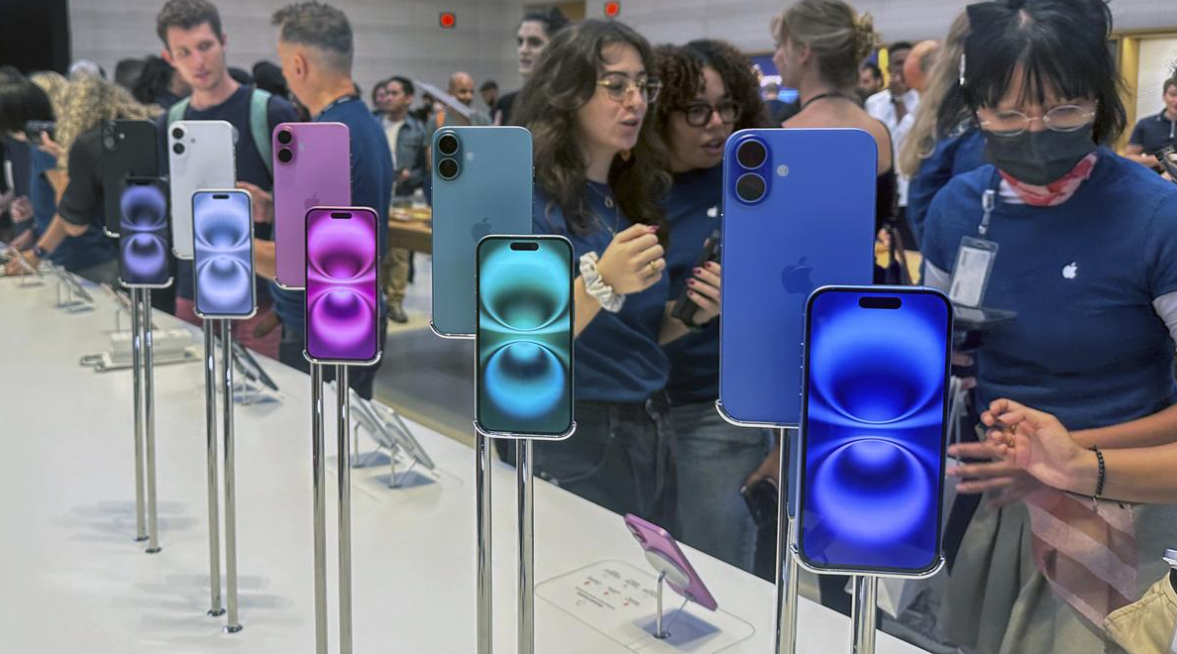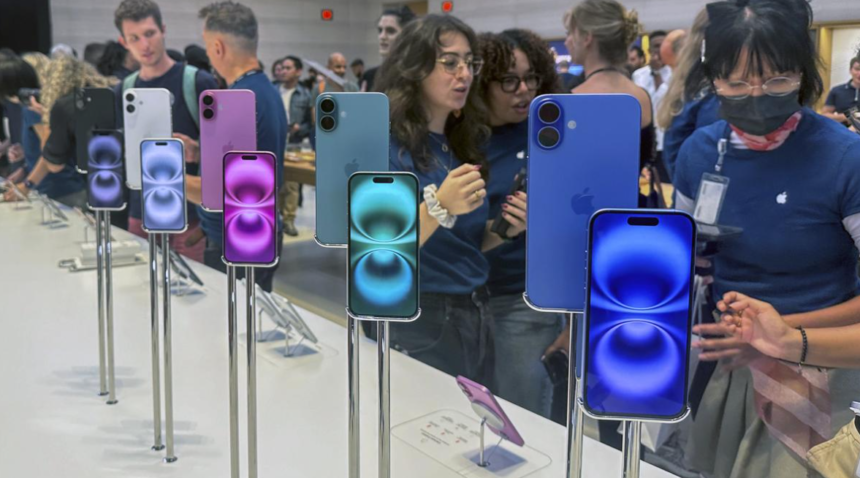Introduction
In a remarkable rebound, Apple saw iPhone sales surge to $46 billion in its latest fiscal quarter, snapping out of a prolonged slump that had dampened investor sentiment. The sales spike, driven in part by AI-powered features in the newest iPhone models, highlights how Apple’s strategic investment in artificial intelligence (AI) is reinvigorating the flagship product that generates nearly half of the company’s revenue. This resurgence underscores Apple’s ability to innovate within a highly competitive smartphone market, where AI enhancements are reshaping user experiences and redefining what consumers expect from their devices.
This article explores how AI advancements have contributed to Apple’s recent sales recovery, the specific features attracting customers, Apple’s broader strategy in AI, and what this sales upswing could mean for the company’s future.
The iPhone Slump: Background and Context
Before this recent surge, Apple faced several quarters of lackluster iPhone sales. Stiff competition from brands like Samsung and Chinese manufacturers, as well as slowing demand in mature smartphone markets, contributed to a decline in revenue from its signature product. Moreover, the high price points of recent iPhone models were seen as deterrents, especially in regions with diverse pricing preferences. These trends spurred concerns that Apple might be losing its innovative edge in the smartphone sector.
Apple’s ability to pivot, however, has often set it apart in the tech industry. In response to declining sales, Apple doubled down on integrating cutting-edge AI technology into the latest iPhone models, transforming the device’s functionality and revamping its appeal.
AI Features Driving Sales in the New iPhone Models
Apple’s recent iPhone lineup has taken AI-driven technology to new heights, enhancing functionality in ways that have resonated with consumers. Some of the standout features include:
- Personalized Photo Editing and Photography Enhancements: Apple’s latest models include an AI-powered photography system that offers real-time scene detection, optimized lighting adjustments, and automatic enhancements, allowing users to capture professional-grade images with minimal effort. The addition of machine learning algorithms that identify individuals, pets, and objects in photos has made the device a preferred choice for photography enthusiasts.
- Enhanced Siri and Voice Recognition: The integration of natural language processing (NLP) advancements has elevated Siri’s responsiveness, accuracy, and context understanding. This is particularly impactful in creating a more conversational interaction, which users report as more intuitive and reliable. Additionally, the AI now supports multi-lingual users with better recognition of language-switching, appealing to Apple’s global customer base.

- Improved Battery Management: AI-based battery management has become a significant draw for customers. Apple’s new models use AI to monitor usage patterns, adjusting background processes to conserve power and extend battery life. This feature has been particularly popular among high-usage consumers, such as gamers and media enthusiasts, who rely on consistent battery performance.
- Security and Privacy Enhancements: Leveraging AI for enhanced security, the new iPhone includes facial recognition and encryption protocols that adapt based on user behavior. The device can detect anomalies in usage patterns and lock down sensitive information if a security breach is suspected. These features are attractive to privacy-conscious consumers and add to Apple’s longstanding reputation for prioritizing user security.
- Health Monitoring and Fitness Tracking: Through AI, Apple has improved its health and fitness monitoring features, which now track user vitals with increased accuracy. The device can detect and analyze subtle changes in health metrics, encouraging users to maintain their fitness routines. This is particularly popular among health-focused consumers, giving Apple a competitive edge in the fitness-tech market.
Apple’s AI Strategy: Investing in Core Capabilities and Custom Chips
Apple’s success in leveraging AI stems from its investment in proprietary AI technology and custom-designed silicon. The A-series Bionic chips powering the new iPhones are specifically optimized for machine learning and AI processes, making the device faster, more responsive, and energy-efficient. Apple’s neural engine within these chips has also enhanced on-device processing, allowing complex AI calculations to occur without compromising privacy by sending data to the cloud.
Moreover, Apple’s acquisitions of AI-focused startups, including those in fields such as voice recognition and health tech, have bolstered its capabilities. Apple’s in-house team is dedicated to refining algorithms that prioritize user experience, ensuring that AI-driven features are genuinely useful rather than mere novelties.
Impact of the AI-Driven iPhone on Market Performance
The new AI-enhanced iPhone models have struck a chord with both loyal and new customers, evidenced by the impressive $46 billion in revenue Apple generated from iPhone sales during the summer quarter. This rebound is particularly notable given the highly saturated smartphone market and the typical seasonality associated with iPhone launches.
Key factors contributing to Apple’s market success include:
- Broad Consumer Appeal: AI-powered photography, battery management, and health tracking appeal to diverse user demographics, from creatives and professionals to fitness enthusiasts and privacy-conscious users.
- Increased Average Selling Price (ASP): With AI-driven features creating higher perceived value, Apple has been able to maintain or increase the average selling price of its devices without deterring demand.
- Return of Upgraders and New Users: AI enhancements have enticed upgraders who previously held off on new purchases. Apple’s continued brand strength, combined with fresh features, has also attracted a new demographic of tech-savvy users interested in smart capabilities.
The summer sales surge indicates that AI can serve as a significant differentiator in consumer technology, particularly for companies like Apple, where the customer experience is paramount. This success also reflects broader consumer acceptance and growing demand for AI features that simplify, enhance, and secure everyday digital interactions.
Competitive Landscape: Apple vs. Rivals in the AI Race
Apple’s AI-powered recovery has set a benchmark for other tech giants, including Google and Samsung, which are also integrating AI into their smartphones and services. However, Apple’s focus on privacy and on-device processing sets it apart, especially as concerns over data security rise globally. While Google offers comparable AI-based features in its Pixel lineup and Samsung in its Galaxy series, Apple’s proprietary chip design and tightly integrated ecosystem have given it a unique advantage.
In particular, Apple’s focus on privacy distinguishes it in a field where data collection and analysis are common. Unlike many of its competitors, Apple’s AI features primarily operate on-device, which means less data is sent to cloud servers. This strategy has attracted users who prioritize security, adding to Apple’s market advantage.
Apple’s AI-Powered Future: Broader Implications and Next Steps
With the success of its AI-enhanced iPhones, Apple is expected to further integrate AI into its product ecosystem. This approach aligns with its broader strategy of developing cross-platform compatibility, where features introduced in the iPhone seamlessly connect with iPads, Macs, Apple Watches, and other devices.
Looking forward, Apple is likely to:
- Expand AI Capabilities in Health and Fitness: Building on the popularity of its AI-driven health tracking features, Apple could introduce more advanced health monitoring options, potentially creating a comprehensive wellness platform that leverages AI and machine learning.
- Refine and Diversify Siri’s Functionality: Apple’s voice assistant, Siri, remains a key component of the company’s ecosystem. By advancing Siri’s conversational abilities, Apple could create a more seamless, integrated assistant that can anticipate user needs and manage cross-device tasks.
- Invest in AR and VR: Augmented reality (AR) and virtual reality (VR) applications could benefit significantly from AI, enhancing virtual environments, user interaction, and real-time feedback. Apple’s anticipated AR headset is expected to integrate AI, creating immersive experiences that bridge digital and physical realities.
- Boost AI Security and Privacy Protocols: Given Apple’s commitment to privacy, further developments in AI-driven security features are expected. The company may enhance its biometric recognition capabilities and develop AI models that protect user data in new and advanced ways.
Challenges and Risks in AI-Driven Strategies
While AI has helped revitalize Apple’s iPhone sales, challenges remain. Integrating AI into personal technology carries inherent risks, including potential privacy concerns, algorithmic bias, and reliance on vast amounts of data. Apple’s dedication to privacy sets a high standard, but it also limits some of the data-driven capabilities its competitors can offer. Balancing privacy with feature richness will continue to be a complex challenge for Apple as it develops its AI-powered offerings.
Additionally, the rapid evolution of AI requires continuous innovation. As competitors race to develop their own AI-driven devices, Apple will need to keep pushing the boundaries of what its models can do to remain at the forefront of consumer technology.
Conclusion: A Renewed Era for Apple’s iPhone, Fueled by AI
Apple’s $46 billion in iPhone sales this summer, attributed largely to AI-driven innovations, marks a new chapter for the tech giant. The company’s strategic use of AI to enhance functionality, improve user experience, and maintain privacy is revitalizing its flagship product at a crucial time. By successfully integrating AI to add tangible value, Apple has demonstrated that it can turn a potential sales slump into an opportunity for growth and differentiation.
As AI technology continues to advance, Apple’s commitment to building robust, user-focused AI capabilities could further solidify its market leadership. With an eye toward innovation and a focus on privacy, Apple is well-positioned to lead the charge in creating AI-driven devices that resonate with consumers worldwide. For Apple’s iPhone lineup, the future is as much about intelligence as it is about innovation. ALSO READ:-ChatBIT Chinese Researchers Develop Military AI Model Based on Meta’s LLaMA: ChatBIT for Strategic Dialogue and Q&A in Defense 2024





